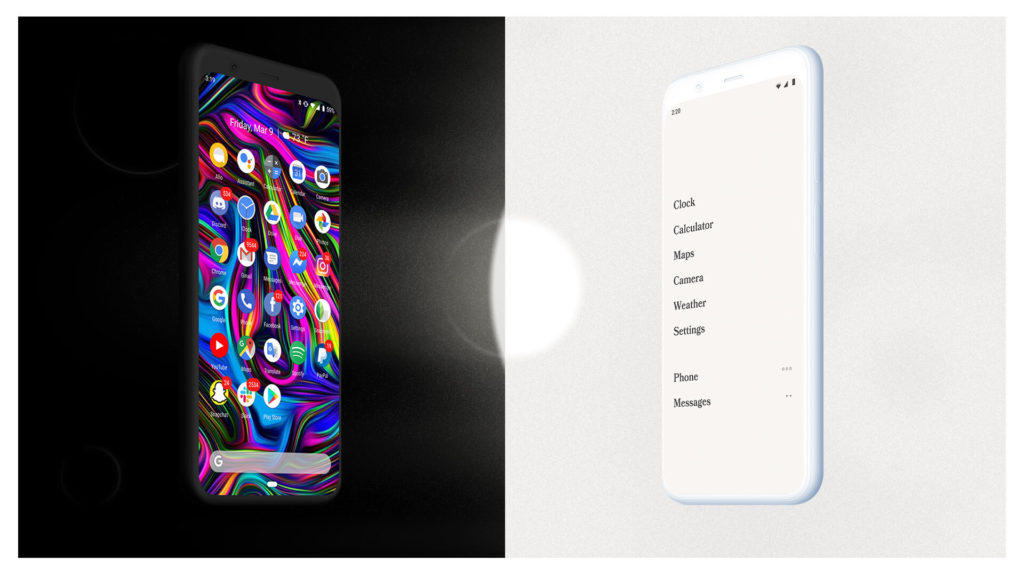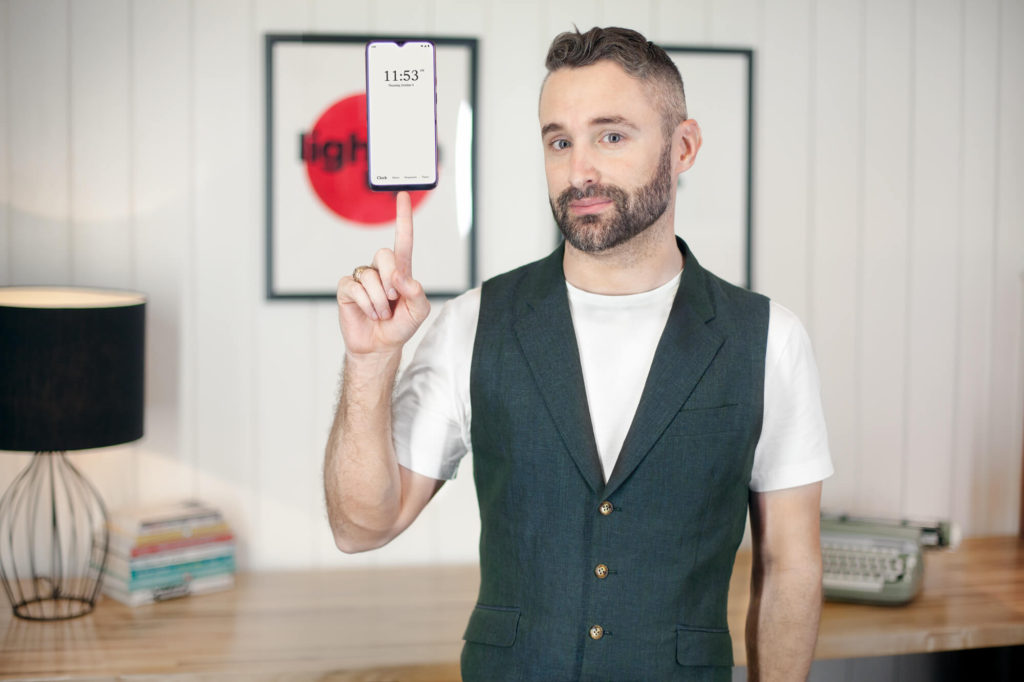This post was last updated on July 13th, 2022 at 09:52 am
What do you call a device that looks like a smartphone but is free of addictive and manipulative features? Chris Kaspar believes he’s holding the answer. It’s the Wisephone.
Kaspar is the founder of Techless, a Texas-based company seeking to curb digital compulsions, rather than introduce new ones. Techless created the Wisephone for people who appreciate the smartphone’s design and some of its tools but don’t like the feeling of a device taking over their lives.
The Wisephone includes calling, texting, a camera, calculator, weather, clock, and maps. Plus, it comes with parental controls. Its best tool is arguably its moral compass, meaning the device is free of apps and social media.
The Wisephone is one of a handful of minimalist phones developed in just the past couple years. It appeals to two different buyers: digital minimalists and parents concerned about how their kids might use a smartphone.
In a Jan. 13 interview with Frugalmatic, Kaspar talked about the Wisephone and the future of minimalist devices. He believes a growing number of people recognize the dangers of digital addictions, and they’re ready for solutions.
Kaspar and his wife, Ciera, have three daughters. The couple have also been foster parents. In fact, the inspiration for the Wisephone came from two of their foster children, siblings ages 10 and 13. The sisters’ case worker told Kaspar that their smartphone use had become problematic. That’s when Kaspar saw an opportunity to create a phone that kids wouldn’t feel embarrassed to use and, at the same time, parents would embrace.
“At the end of the day, we’re not really selling a phone. What we’re selling is something more abstract. We’re selling peace of mind. We’re selling trust,” Kaspar said.
Read more excerpts from our Jan. 13 interview below.
Frugalmatic: I love the name Wisephone. It’s a natural fit for a minimalist device like this. Plus, I just hate that term, “dumb” phone. How did you land on that name, in some kind of brainstorming session or did it just pop into mind one day?
Chris Kaspar: One of the trends I’m seeing is that people are starting to value EQ (emotional intelligence) over IQ, and they’re starting to realize being smart isn’t the pinnacle of success. There is something more to life than being just smart. The idea of a smartphone gives us unlimited access to information, but the idea of a Wisephone questions the assumption that smarter is always better. We did land on it in a brainstorming session with the whole team. It was a fun session. The pursuit of wisdom is more important than the pursuit of knowledge, and we’re kind of emphasizing that.
F: How would you say your own experience using smartphones has evolved over the years?
CK: I’ve been all over the map. I didn’t have text messaging until I was in college. And then I went all in with smartphones. I even struggled myself, heavily, with addiction to digital entertainment. I landed at a place where I realized that’s not what brings me the most satisfying life. So I’ve cut back. Even now, I haven’t cut back entirely. It might be hypocritical for me to do this, but I actually use a smartphone every now and then when I’m traveling, or when I need it. I just got off of a two-week trip to Pakistan, and I brought my smartphone with me. It’s hard to travel without one in today’s world.
But the most important thing is I feel I have mastered my technology in the sense that it doesn’t control me anymore. I use my Wisephone during the week. It’s not this constant temptation for entertainment or for superficial connection. It’s tech on my terms, instead of on its terms.
F: I read an interview posted on the Techless website, and it sounded like two of your foster children inspired the Wisephone. Before they came to your home, smartphones had created problems for them. What has been their response to using the Wisephone?
CK: They’re actually not in our house anymore and left before the idea of Wisephone was fully born. That’s kind of the nature of foster kids. We gave them an Amazon Alexa while they were here, because it had no screen. But they were great with it because, in the foster world, they have very little control over things in their life. Their life is flipped upside down on its head every nine months. For them to have this device that was theirs and that we didn’t have to monitor, that we didn’t have to check in on, it was actually a lower-control, high-trust tech relationship that we had. It actually really improved our relationship with them whenever they were using it. It was a nonissue. It was no big deal for them, even though they were used to smartphones.
F: I think a lot of parents would take note of what you said, in terms of the improved relationship because it does seem to become such a sticking point between parents and kids in how they use their devices. What are you hearing from parents about what you’ve designed?
CK: Parents love it. At the end of the day, we’re not really selling a phone. What we’re selling is something more abstract. We’re selling peace of mind. We’re selling trust. We’re selling that they don’t have to spend hours and hours researching and finding solutions and enforcing solutions and fighting this constant battle with their kids. It’s just a one stop shop, “Boom, here you go. Give it to your kid, and you don’t have to worry about it.”

F: There does seem to be a stigma with using flip-phones, or “dumb” phones. With teens, in particular, what are you finding in terms of what they consider important: Do they care more about what their hardware looks like, or what sorts of apps and features are available on their phone?
CK: So for kids, a phone is a status symbol on so many levels. It’s like their very first status symbol, other than the pair of shoes that they wear. So the form factor (size, shape and style of the device) matters. That’s why we decided to go with the smartphone form factor. That’s why we spent a ton of time, countless hours with some of the world’s best UX/UI (user experience/user interface) designers, working on the design.
Actually, it’s not designed to be a kid’s phone. It’s absolutely designed to be a phone for adults, professionals, digital minimalists because, at the end of the day, kids actually reject kids’ technology. We wanted to make it an adult device.
Now, on the flip side, there are apps we don’t have that a lot of kids would like to have. Kids would love to have Minecraft on this device. We don’t have Minecraft. Kids would love to have social media. We don’t have social media. There are some absolute intentional sacrifices and boundaries. But you don’t give a 10-year-old a driver’s license. You don’t give them energy drinks. You don’t give them lots of things to protect them because you know what’s best for them. So this is one of those cases where it’s sort of this compromise. But I think what’s important is that, deep down inside, I think every kid knows that this is what’s healthy for them.
F: I know you’ve cited market data indicating that a large majority of parents are concerned about how their kids use their devices and the amount of time they spend on them. But why has the market been so slow to respond to this problem?
CK: I think it’s because we’re fighting human nature. I mean, fast food. Everyone knows it’s bad for you, but McDonald’s is still around and thriving because it tastes good. It’s easy. It’s convenient. And this (smartphone) technology is exactly the same thing—it’s the equivalent to fast food. It’s easy. It’s cheap. It’s accessible.
Another interesting market data point for us is that we found is that the more money people make, the more interested they are in our phones. So people making more than $100,000 a year are way more interested in our devices than people who are at the poverty line. I think that speaks to them understanding that, hey, this is unhealthy. People are finally starting to realize, like they did with fast food and cigarettes, that this (constant smartphone use) isn’t good for us. It’s just now the actual change is starting to enter the market.
F: It seems like people are starting to need a smartphone to participate in the economy. Some sporting events require you to present your ticket with a smartphone app. I’ve heard of things like laundromats requiring apps to use their machines. Do you share this concern at all, that this pressure to carry around a smartphone will only increase over the next few years?
CK: My theory is that we’ve reached the top. But, you’re right, it is a challenge. And just to add to that: A lot of schools right now are requiring kids to have smartphones in order to engage with their swim team or to do homework assignments. I would say that’s something we need to challenge. Ten years from now, it will be safe to assume that there’s a world that exists where people can survive without a smartphone. But right now, I mean, my car starts with a smartphone. So, I’m not brushing it under the rug, but I do think it’s going to change in the next decade.
F: There are a few other minimalist phones on the market and being developed right now. What would you say sets the Wisephone apart from the rest?
CK: One is we’re using existing hardware (from Samsung) instead of creating our own hardware, which is a major advantage because our hardware just works. A lot of the other minimalist phones out there have challenges. E-ink screens are very laggy and difficult to type on. Some of them have T-9 keyboards instead of full-featured keyboards versus we have a standard smartphone (keyboard). A lot of challenges with minimalist phones regarding hardware have just disappeared for us.
Secondly, from a software perspective, what we’ve built is extremely nimble, agile, and updatable. A lot of minimalist phones don’t have a way to easily update. So we have regular feature improvement, software updates, and we just invisibly push things. Overarching, the user experience is very smooth, and we have new features coming down the pike at a much faster pace than a lot of the other minimalist phones out there.
I think the biggest advantage we have is that we’re the only company that has a robust backend that is connected to the device, completely enmeshed. That backend, really for parents, is a lifesaver. It gives complete insight into location history, messaging, call logs, battery status. And we’re working on some very advanced functionality. For example, if a kid receives a sex message, Mom and Dad can know about it. And that backend words without a data plan. So it saves people a ton of money.
F: What I read about minimalist phones is that they all have slightly different features. They all mostly allow texting and, of course, calling. Yours has GPS and allows you to take photos. How do you decide where to draw the line in terms of what features to include on a phone?
CK: That’s a deep ethical question. It’s definitely a wrestling match, internally within our team and with our customers. So, for us, we’ve set some hard and fast boundaries. There are things like, we guarantee there’s going to be no pornography on the device. That’s just an ethical, moral boundary that we drew that a lot of companies won’t draw. That’s something we said is not going to happen.
One of the other things we said is there’s never going to be solo entertainment. Meaning, we might come out with a game where people have conversations with one another, like conversational flashcard games. But that’s face-to-face, eye-contact-type games. We’re not going to have any type of entertainment or movies where you’re sitting down and checking out on your device. There’s other things related to privacy that we definitely have boundaries around. But just those three, in a nutshell, and you cut out a significant amount of functionality that a lot of people depend on for their smartphones.
And I think the big litmus test for us is, does this improve relationships or does this take away from relationships? That’s the lens we’re looking through. We’re looking at statistical information and research to determine is this healthy for you or is this unhealthy for you? That’s going to be the determining factor for us.


Hey everyone, I wanted to say thanks for reading this article; we’re fans of Frugalmatic!
If you have any questions, shoot an email to hi@techless.com or check out Techless.com